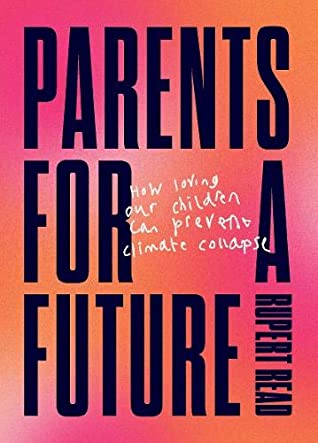Parents For A Future
Much of the book addresses a problem much discussed in environmental philosophy, which is why we should care about what happens in the future, particularly the distant future when we will be long dead. Read’s answer is simply that the future matters to us because we love our children

Published by UEA Publishing Project, 2021
I was rather reluctant to read this book as I feared being told that as a parent I had a particular responsibility to address climate change. Parents these days have enough to cope with without having this put on their shoulders as well. However Read does not do this, or at least not until right at the end when he suggests that parents need to lead a ‘Parents for a Future’ movement, as children and young people have led ‘Fridays for a Future’.
Much of the book addresses a problem much discussed in environmental philosophy, which is why we should care about what happens in the future, particularly the distant future when we will be long dead. Read’s answer is simply that the future matters to us because we love our children (or if, like Read, we don’t have our own children, we love our nieces and nephews, God-children, etc.). If we value our children then we should value what they most deeply value, which will be their children, and so on down the generations. Thus care for one’s own children equates to care for people in the distant future and, because we don’t know where our descendants will live, for future people all over the world. He argues that because these future people will need a functioning ecosystem to live in, care for our children means care for the whole biosphere:
“There is no ‘us’ versus ‘our environment’; there is only one seamless, beautiful web of Life” (p.78).
As for what needs to be done, Read avoids long lists of policy prescriptions, sticking to the ways of thinking and institutional arrangements we need. The paradox is that we need to both pause - to reflect and reassess everything from a long-term perspective - and to act immediately to respond to the crisis. Adapting the old slogan, ‘think global, act local’ Read suggests we need to ‘think long-term, act now’ (p.94). If we are going to mitigate the collapse of current systems that climate change is likely to bring about we need to see that collapse as already underway – only then will we take the necessary action. Read reiterates the demands of Extinction Rebellion, of which Read has been a national spokesperson, for a Citizens’ Assembly and his proposal (set out in a Green House Report in 2012) for Guardians For Future Generations. Guardians would be a randomly selected group who would be tasked with protecting the interests of future people, with the right to veto proposed legislation and force a review of existing legislation.
A thread running through the book is that decisions need to be underpinned by the precautionary principle. This leads to the recognition that uncertainty, for example as to the exact impacts of increasing greenhouse gas concentrations in the atmosphere, is an argument for action, not against it. Asking for clear evidence first, as governments tend to do now, is reckless.
The final chapter is addressed directly to the reader: ‘What are you to do?’. Unlike so many public-facing campaigns on climate change which set out our dire situation then ask people to change their lightbulbs or take shorter showers, Read’s ask is commensurate with the challenge facing us: your money and/or your life. He asks the reader to devote their lives to ‘the cause of Life’, or if not to give their money (by which he does not mean just a monthly standing order). He also emphasises that purely individual responses are insufficient: we need to act collectively, join with others and build community.
Read has attempted to provide some ‘felt binding power’ (p.16) to the idea that we must safeguard our environment for future generations, to engage our emotions in what is primarily a rational argument. But the second step in his argument is that loving someone involves loving what they value. Is this really the case? He does caveat this with saying we love what they ‘most deeply’ value, and perhaps it does not seem too controversial a claim when it comes to our children’s children. However, I think he rather overestimates our ability to care for our more distant descendants in the way that we love and care for our children. My love for my son is built on years of getting up in the night to feed or comfort him, hours spent in playgrounds, or in making slow progress on walks, sharing his life as he grows up and, crucially, his dependence on and love for me. Love for a child is love for a real human being, who may surprise or (perhaps frequently) frustrate us, not for an abstract idea of a future person. Intellectually, I can recognise that loving my son means also caring for those who come after him but I can’t say that what I feel about my as yet unborn descendants, if there are any, has anything remotely like the same emotional force.
At several points I wondered whether Read really needs to make the future generations argument. Climate change is going to have sufficient impact during the lifetimes of all those who are young now that caring just for them, who are already here, provides sufficient reason for us to act. Bringing in more distant future generations is perhaps more necessary when we think about the issue of nuclear waste, which Read discusses. This will be hazardous for hundreds of years, but in the shorter horizon of the lives of our children perhaps it seems feasible that we will be able to keep it safe and for many (though not for me) the advantages of the energy it provides outweighs the risks.
For me I don’t really see any need to argue that we should care about the environment because we care about future generations – I care about the continuation of the world we live in, with all its beauty and wonderful diversity of life anyway. So perhaps this book is not really addressed to me. If it is addressed to those less engaged in the environment movement my quibble is in some of the language Read uses which presupposes a knowledge of debates and literature which he should not expect his readers to have. In particular Read uses the term ‘white swan’, referring to work by Nassim Taleb and by Read himself, a white swan event being a predictable one, in contrast to ‘black swan’ things that can’t be predicted from what has gone before, but this is never explained. Putting this quibble aside the book is, as Read says, an essay – a try – at transforming the way we think and what we do so as to get ourselves out of our current situation. I hope it has at least some measure of success.



